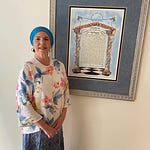Ariel Yaniv Ha’Or Ben Avraham was born in the “small country” of Detroit (as he calls it.) At age 4, he was given an IQ test and discovered to be very smart, and therefore went to The Roeper School. At age 13, he started working at the Charles H. Wright Museum of African American History. He used to subscribe to the ideology of Hoteps, believing that everything great came from Egypt. He did a deep-dive into Islam, when from ages 17-19 he considered converting from the Christianity he had already left behind. Ultimately he decided to convert to Judaism, first through the Conservative movement, then over the course of ten years through the Orthodox movement. He now follows (Rabbeinu) Rebbe Nachman of Breslov (the Breslover Chasidic tradition) as well as Yemeni Baladi.
Ariel works in many fields, including film and television, fashion photography, and a pop-up axe-throwing service called Danger Games. (Bookingdangergames@gmail.com) He has designed a museum exhibition called “One Woman” that focuses on the Biblical story of Dina - her rape, her family’s defense of her, and an Aggadic tale about the family’s response to a Caananite condemnation of them. We had a wide-ranging discussion, covering everything from the agricultural clay of Israel to King David’s stories told three ways.
“When there’s a paradigm shift, everybody looks for an icon, a leader.”
“I don’t know any other people, in the history of people, that have been convinced, wholesale, not to return to their home.”
From this interview and my follow-up research, I learned a lot, especially about a few African-American subcultures, and influences on Sephardic/Yemeni Jewish thinking.
See below for a Glossary of terms used in the interview.
I dedicate this interview to a dear friend of mine who died this week, Howard Crosner. Howard was a defense lawyer in Toronto, as well as the Honourary Consul-General of Burundi. He was also very, very funny. He was loved and he will be missed.
Chag Pesach Sameach!
This year we have unusual scheduling. Tonight, Thursday night, is the ritual of “Bedikat Chametz,” searching out all bread products in your home and pockets to give to a non-Jewish friend, sell, eat immediately, or burn. Tomorrow is the burning of the chametz, which usually takes place in the morning, but because of our unusual schedule, can happen any time until sunset. Here in Jerusalem, there are fire pits on every street corner. I love the smell.
Shabbat is Erev Pesach. That means, for a rare occasion, people can rest and enter Pesach in a relaxed way. We are commanded to eat challah on Shabbat, which is impossible because we won’t own chametz after tomorrow, but we Jews can always do the impossible. So eat your challah outside and don’t leave any crumbs. After a regular Shabbat evening, Saturday will be weird: the challah at lunch must be eaten before 10:30 am, after which — no challah for you! For seudah shlishit, Third Meal, you can neither eat challah, nor matzah, because we don’t eat matzah the day before Passover. So eat fruit or something. Or just stay hungry for the Pesach Seder. (Laurentina’s opinion: Don’t do that, unless you enjoy fasting. You don’t actually eat at the Seder until halfway through.)
Saturday night - Havdallah is modified, separating “holy from holy,” and not “holy from everything else.” After that - enjoy your Seder! It’s the beginning of Pesach!
Sunday is the first day of chag Pesach. Eat a festive lunch. (My family didn’t used to do that, it’s great to do it now.) Here in Israel, Monday is not a chag. Outside of Israel, it is — meaning a three-day chag! Good luck, and enjoy!
Sunday night begin to count the Omer. That’s right, we’ve only started a 7-(or 8-)day holiday, and already we’re counting the days until Shavuot.
Glossary (in order of appearance)
Baruch Haba - Welcome (literally, Bless the Coming)
chutz l’aretz - outside of Israel (literally, outside the Land)
l’havdil - to separate, make a distinction between concepts
Aggadah (adjective Aggadic) - narrative additions on Torah, especially in Talmud or Midrash
Yeshu - alternate word for the central figure of Christianity
Toldot Yeshu - text dating to Medieval times describing a different version of Yeshu’s life
Yeshiva - Jewish rabbinic academy of higher learning
Rambam - Rabbi Moshe Ben Maimon, Maimonides, 12th-century Sephardic Rabbi
Halakha (adjective Halakhic) - Jewish law
Balaam - Biblical figure, a non-Israelite prophet hired to curse the Israelites
Targum Yonatan (Jonathan) - Aramaic translation of the Prophets
Har Horev - Mount Sinai
Kever - grave
Me’Am Loez - commentary on the Torah written by Rabbi Yaakov Culi in 1730. Published in English as The Torah Anthology translated by Rabbi Aryeh Kaplan
Nuwaubian Nation - black supremacist cult incorporating ideas about Ancient Egypt, UFOs, Islam, etc., founded by Dwight York. It had a compound and was dismantled in 2004
Five-Percent Nation - a Nation of Islam spin-off that is a huge influence on hip hop. In 1965 the FBI falsely claimed the name means “The five percent of the Muslims who smoke and drink.”
David HaMelech - King David
Tefillin - ritual object Jewish men wrap every morning
Shamayim - Heaven (literally Skies)
Shahada - Islamic statement of faith. Saying it converts a person to Islam
To go up for aliyah - being called to the Torah
yashar - straightforward
midbar - desert, wilderness (he is referring to the Israelites’ 40-year non-linear journey in the Midbar, as recounted in 4 of the 5 books of the Torah)
make Aliyah - move to Israeli
This is fine meme - https://www.dictionary.com/e/memes/this-is-fine/
Talmidim - Jewish scholars
Teshuvah - return (to holiness)
Shevet Yehuda - Tribe of Judah
lashon - language, wording
Al Hanissim - “On the Miracles,” a formula recited in prayers and grace after meals on Purim and Chanukah











Share this post